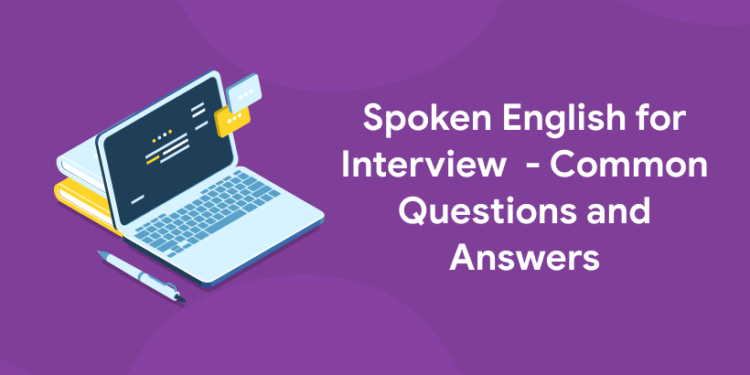Table of Contents
Introduction
Preparing for a job interview can be challenging, especially when you are expected to communicate confidently in English. Whether English is your first language or not, being able to express yourself clearly and naturally during an interview greatly improves your chances of success. This guide is designed to help you prepare by providing common interview questions with thoughtful sample answers, practical tips to improve your spoken English, and strategies to overcome interview anxiety. Mastering spoken English in an interview setting will not only boost your confidence but also showcase your professionalism and suitability for the job.
Why Spoken English Matters in Interviews
1: Which of the sentences below is grammatically correct?
In today’s global job market, English proficiency gives you a competitive edge. Employers value candidates who can clearly express their thoughts and engage in professional conversations. Even if English is not your first language, practicing common interview questions can reduce anxiety and help you perform well.
Spoken English Course for Guaranteed Confidence and Career Growth
Spoken English Course by Entri App: Enhance your communication skills, gain certification, and boost your career with confidence.
Join Now!Essential Tips for Interview Success in English
1. Research the Company and Role:
Understand the company’s mission, values, and the specifics of the role you’re applying for. This enables you to tailor your answers to show how you fit with the company culture and can fulfill the job requirements. Use the company’s website, annual reports, and recent news as starting points.
2. Practice, Practice, Practice:
Rehearse answering common interview questions out loud regularly. Practice with a friend, mentor, or through mock interviews. Recording yourself can help identify areas for improvement in pronunciation, grammar, and clarity. The more you practice, the more natural your responses will become.
3. Dress Professionally:
First impressions count. Choose clean, well-fitted professional clothing appropriate for the company and industry. Feeling comfortable and confident in your attire helps reduce nervousness.
4. Be Punctual:
Arrive early or log into virtual interviews ahead of time. Plan your travel or test your technology in advance to avoid last-minute hitches.
5. Maintain Positive Body Language:
Make eye contact, smile genuinely, and sit upright. Use gestures moderately to emphasize points but avoid fidgeting. Positive body language can reinforce your spoken words and convey confidence.
6. Listen Carefully and Think Before You Speak:
Make sure to understand each question fully before beginning your answer. It’s okay to pause briefly to collect your thoughts, which helps provide more thoughtful and organized responses.
7. Prepare Relevant Questions:
At the interview’s end, asking insightful questions about the role or company shows your interest and engagement. Avoid questions easily answered by the company’s website.
8. Stay Positive and Honest:
Highlight your achievements but remain humble. If discussing weaknesses or gaps, be honest and focus on how you’re improving.
Common Questions for Interviews in English
If English is not your aboriginal language, you may feel anxious about a job interview that will be in English. You can reduce your worries by practicing for the most common questions that interviews ask in English interviews. In this article, we’ll discuss how to best practice for an interview in English and 10 of the most common interview questions to practice answering in the English language.
The following mentioned are the most commonly asked interview questions that you can be ready to answer in English when you go to your interview:
-
Tell me about yourself
This is one of the most common questions asked in an English interview and any other interview also. However, while it may be tempting to reveal everything about yourself, such as where you’re from and your favorite hobbies, it’s essential to keep your answer concentrated on your career and abilities. For example, you could tell the interviewer why you’re curious about the position, how long you’ve been in the industry or field and what your career growth goals are.
-
What are your strengths?
“What are your strengths?” is another repeatedly asked question during English interviews. This question is asked to permit the interviewer to get a sense of your abilities and qualifications that are precise to the position. To correctly answer this question, spend some time before the interview researching the position and discovering the qualities required to perform well in that job. Then, tailor your answer to concentrate on strengths that are connected to the job and show you are qualified of adding value to both the position and the company as a whole.
-
Tell us about your experience and education
Interviewers ask this question to decide if you have the precise experience and education required to perform the duties of the job you’re involved in. For example, if you’re involved in a copywriting position, the hiring manager will likely want to hear that you have a bachelor’s degree in English, writing, journalism, or a corresponding field. While you don’t require to reveal every bit of education and experience you’ve ever received, be sure to include all pertinent information that sustains your ability to do well in the position.
The following are examples of education and experience to possess in your answer to this question:
-
- Your degrees
- Any diplomas you’ve acquired, such as those from a polytechnic college
- Any certifications you’ve received that support your ability to thrive in the position
- Previous work experience that connects to the position you’re applying for
-
Why are you quitting your current job or why did you quit your last job?
Many employers like to know what made you leave your previous job. This is mostly because they want to make sure you were not terminated due to inappropriate conduct or performance. No matter what the reason, try to deliver an answer that positively shows your reasoning. For example, rather than saying “I was terminated from my last position,” you could say “I feel I wasn’t capable of effectively utilizing my talents in my previous role.”
Spoken English Course for Guaranteed Confidence and Career Growth
Spoken English Course by Entri App: Enhance your communication skills, gain certification, and boost your career with confidence.
Join Now!-
What are your salary expectations?
Another typical question that interviewers ask in nearly any interview is what type of salary you expect. If it’s your first interview, don’t feel obliged to deliver a specific number. Instead, you could ask about the pay range they have set for the position you’re applying for to obtain an idea of if that range meets your expectations. If you’re going to a second interview, spend some time exploring the average salaries for people in the position with equivalent experience and education as you. You can use this number as a starting point when concerning salary during the interview.
-
Why do you wish to do this job?
Many interviewers ask applicants why they are curious about the position and/or the company they are interviewing with. When answering this question, it’s essential to concentrate on how your abilities and experience can help the company and position. You can also be concerned about the fact that you want to grow with the company, as many employers want to hire employees who plan to stay with the business for at least 4 years.
-
How do you handle stress or pressure?
I handle stress by staying organized and prioritizing my tasks. When faced with tight deadlines, I break down work into smaller steps and focus on completing each part efficiently. I also practice mindfulness techniques like deep breathing to stay calm and maintain focus.
-
Can you describe a time you worked successfully in a team?
In a previous project, I collaborated with a cross-functional team to launch a new product. I communicated regularly, shared updates, and helped resolve conflicts by listening to different viewpoints. Our teamwork led to a successful launch ahead of schedule.
-
What motivates you to perform your best at work?
I am motivated by opportunities to learn and grow professionally. I enjoy taking on challenges that stretch my skills and contribute to the company’s success. Positive feedback and seeing tangible results also inspire me to give my best.
-
Tell me about a time you showed initiative.
In my last job, I noticed a gap in the onboarding process for new team members. I proposed creating a detailed guide and volunteered to develop it. This initiative helped new hires get up to speed faster and reduced repetitive questions for the team.
-
How do you prioritize your tasks?
I prioritize tasks based on deadlines and the impact on overall goals. I use tools like to-do lists and calendar reminders to organize my day. If urgent issues arise, I reassess my priorities and communicate any changes with my supervisor.
-
What are your weaknesses?
Interviews often ask candidates what their weaknesses are to get a better sense of if they are conscious of their own restrictions. Knowing your limitations and being ready to examine them can show honesty as well as a willingness to work on these limitations. When answering this question, concentrate on weaknesses that can be solved by executing typical actions. For example, you could say “one of my weaknesses is my anxiety when it comes to public speaking. However, I have found that practicing breathwork and practicing my speech beforehand especially benefits reduce this anxiety.”
-
How do you describe your job to others?
I usually say that I work as a [job title] at [company name], where I am responsible for [briefly describe main tasks]. I enjoy helping the team achieve our goals and learning new skills every day.
-
What do you like about your current role?
I like the opportunities to solve challenging problems and collaborate with talented colleagues. It’s rewarding to see how my work directly contributes to the success of our projects.
-
How do you balance work and personal life?
I make sure to set clear boundaries between work hours and personal time. I prioritize my tasks during the day so I can relax in the evenings and spend quality time with family and friends.
-
Tell me about your hobbies or interests.
In my free time, I enjoy reading books, especially about technology and self-development. I also like going for walks and practicing yoga, which helps me stay relaxed and focused.
-
How do you stay updated with industry trends?
I follow trusted websites, read industry newsletters, and participate in professional groups on social media. I also attend webinars and training sessions whenever possible to keep my knowledge current.
-
Why should we hire you?
This is one of the most common questions asked by employers and is sought at determining whether a candidate fully comprehends the needs for the position and their ability to meet those needs. A great way to train for this question is to study the job listing and the conditions for the position. Make a list of the capabilities you have that fit these requirements and use these in your answer.
-
What are your career goals for the next coming years?
Many employers like to hire employees who will remain with the company for several years. They also like to hire employees who are enterprising and want to grow in their careers. When answering this question, try to include how your plans align with the company’s purpose and goals and how your career goals can eventually benefit the company.
-
Do you have any questions for us?
This question is usually asked at the end of an interview to permit aspirants to ask any questions they may have about the position or company. Try to avoid saying “no” and come ready to the interview with a list of questions you have so you have them ready when you’re asked. For example, you could ask about the company’s activity and growth program or whether there is room for growth within the position you’re applying for.
Conclusion: Take Your English Interview Skills to the Next Level with Entri
Mastering spoken English for interviews is a valuable skill that opens doors to exciting career opportunities. While practice and persistence are key, getting guided support can accelerate your progress. Entri’s Spoken English Course is designed specifically for job seekers and professionals who want to improve their English communication confidently and effectively.
With expert tutors, focused lessons on interview scenarios, and interactive speaking practice, Entri helps you build fluency, polish pronunciation, and develop the right answers to common interview questions. The course also includes personalized feedback and practical tips to handle stress and tricky questions smoothly.
Start preparing with Entri today and step into your next interview with confidence, clarity, and the skills to impress any employer. Visit the Entri Spoken English Course page to learn more and enroll.
| Related Links | |
| Coronavirus Pandemic | Leave Application Formats |
| Idiomatic Phrases | Complaint Letter Format |
| Basic Grammar Rules | Commonly used Antonyms |
Spoken English Course for Guaranteed Confidence and Career Growth
Spoken English Course by Entri App: Enhance your communication skills, gain certification, and boost your career with confidence.
Join Now!Frequently Asked Questions
What is the ENTRI Spoken English Course?
The ENTRI Spoken English Course is a Cambridge-certified program designed to help learners improve their fluency, pronunciation, vocabulary, and confidence in both professional and everyday English communication. It includes live sessions, recorded lessons, conversation labs, and AI-powered practice tools.
Who can benefit from this course?
This course is suitable for students, job seekers, professionals, homemakers, and anyone looking to enhance their spoken English skills for interviews, workplace communication, or daily conversations.
Will this course help me prepare for job interviews in English?
Absolutely. The course offers specialized modules on interview preparation, including mock interviews, tips for answering common questions, real-time feedback, and language exercises to help you communicate clearly and confidently in interviews.
Do I need prior knowledge of English to join the course?
No prior advanced knowledge is needed. The course offers Basic, Intermediate, and Advanced levels so you can start learning according to your current skill level.
How are the classes conducted?
Classes are a combination of live interactive sessions with expert mentors, recorded video lessons you can watch anytime, conversation labs for practical speaking, and AI-assisted practice to improve your pronunciation and grammar.













